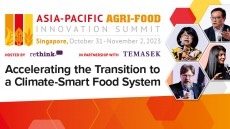‘The voluntary code is not working’: Experts call for an end to the ‘exploitative marketing’ used by the baby formula milk industry

In it, experts call for an international legal treaty to end what it said was ‘irresponsible formula milk marketing and political lobbying’, accompanied by more effective breastfeeding support worldwide.
Series co-author, the WHO’s Professor Nigel Rollins, said: “The sale of commercial milk formula is a multi-billion-dollar industry which uses political lobbying alongside a sophisticated and highly effective marketing playbook to turn the care and concern of parents and caregivers into a business opportunity. It is time for this to end. Women should be empowered to make choices about infant feeding which are informed by accurate information free from industry influence.”
He said fewer than half of infants globally are breastfed as recommended, adding: “We need to see wide-ranging actions across different areas of society to better support mothers to breastfeed for as long as they want.”
Are 'powerful' formula players ignoring WHO guidelines?
Triggered by 'The Baby Killer' investigative report into Nestlé’s marketing of formula milk in the Global South in the 1970s, the World Health Assembly developed the voluntary International Code of Marketing of Breast-milk Substitutes in 1981 – a landmark public health agreement to protect mothers from aggressive marketing practices by the baby food industry.
But according to the experts, the powerful influence of the milk formula industry and the marketing of their products in violation of the Code continues.
Sales from commercial formula milk have rapidly increased over the past 20 years and are now valued at more than $55 (EUR51.3) billion a year. But the papers accuse formula milk companies of employing exploitative tactics to sell their products, including taking advantage of parents’ worries about their child’s health and development.
According to the papers, one common reason women introduce formula milk is interpreting unsettled baby behaviour, especially disrupted sleep and persistent crying, as a sign that breast milk is insufficient. However, sleep patterns of babies are not the same as for adults and unsettled baby behaviours are common, according to the papers. When mothers are appropriately supported, concerns can be addressed successfully without the use of formula milk, the experts said.
“The formula milk industry uses poor science to suggest, with little supporting evidence, that their products are solutions to common infant health and developmental challenges,” said Professor Linda Richter from Wits University in South Africa. “Adverts claim specialised formulas alleviate fussiness, help with colic, prolong night-time sleep, and even encourage superior intelligence. Labels use words like ‘brain’, ‘neuro’ and ‘IQ’ with images highlighting early development, but studies show no benefit of these product ingredients on academic performance or long-term cognition. This marketing technique violates the 1981 Code, which says labels should not idealise the use of formula, and exploits poor science to create an untrue story to sell more product.”
Professor David McCoy of United Nations University went on to say the voluntary Code is not working – formula milk companies chose to disregard the guidance and lobby at every opportunity to weaken regulation, he said. “We need a stricter international legal treaty on the marketing of milk formula which is incorporated into law across the world. The treaty must protect policymaking from industry influence, with obligations for senior public officials to divulge meetings with lobbyists and requirements for scientific organisations to disclose funding sources and members of expert advisory groups. This would regulate the commercial milk formula industry while not restricting the sale of the products to those who need or want them. More generally, the global and public health community must also be much more critical about public-private partnerships that enable or tolerate conflicts of interest.”
Nestlé throws its weight behind 'well-drafted and well implemented' legislation
In response, Nestlé stated it supports efforts by national governments to promote environments that are conducive to breastfeeding and optimal child nutrition which includes healthcare and maternity protection systems as well as local legislation.
“The most effective way to secure World Health Organization (WHO) Code compliance is through well-drafted and well implemented legislation. Nestlé is willing to actively engage with stakeholders to encourage implementation of the Code and subsequent relevant resolutions into national laws,” a spokesperson said.
“We support the World Health Organization’s recommendation of exclusive breastfeeding for the first six months of a baby’s life, followed by the introduction of adequate nutritious complementary foods along with sustained breastfeeding up to two years of age and beyond.”
Nestlé stressed it does not promote formula for infants 0-6 months across the world. In 163 countries, most of which have high rates of malnutrition, it applies a ‘stricter policy’ and does not promote formula for infants 0-12 months.
It added that it will “fully comply with the WHO Code and subsequent WHA resolutions as implemented by national law or its own policy on the responsible marketing of breastmilk Substitutes, “whichever is stricter”.
However, looking at the overall formula landscape, Nestlé noted that the practices of companies “vary widely”. Nestlé, it stressed, has been recognized as industry-leading for its lobbying practices and is assessed as highly compliant as it relates to its responsible infant formula marketing.
“We will continue to focus on supporting families on their infant feeding choices and contributing to the best possible nutrition for the healthy development of infants and young children driven by evidence-based science,” the spokesperson added.
Claims of 'systematic and unethical' marketing not isolated
This is not the first instance, however, of the baby formula industry being called out for misleading marketing. The Lancet’s accusations follow similar ones from last year when more than half of parents and pregnant women (51%) surveyed for a new WHO/UNICEF report said they had been targeted with marketing from formula milk companies, much of which was in breach of international standards on infant feeding practices.
The report uncovered systematic and unethical marketing strategies used by the formula milk industry to influence parents’ infant feeding decisions.
Marketing techniques included unregulated and invasive online targeting; sponsored advice networks and helplines; promotions and free gifts; and practices to influence training and recommendations among health workers. According to the WHO/UNICEF report, messages that parents and health workers received often violated the International Code of Marketing of Breast-milk Substitutes.
“This report shows very clearly that formula milk marketing remains unacceptably pervasive, misleading and aggressive,” said Dr Tedros Adhanom Ghebreyesus, WHO Director-General. “Regulations on exploitative marketing must be urgently adopted and enforced to protect children’s health.”















